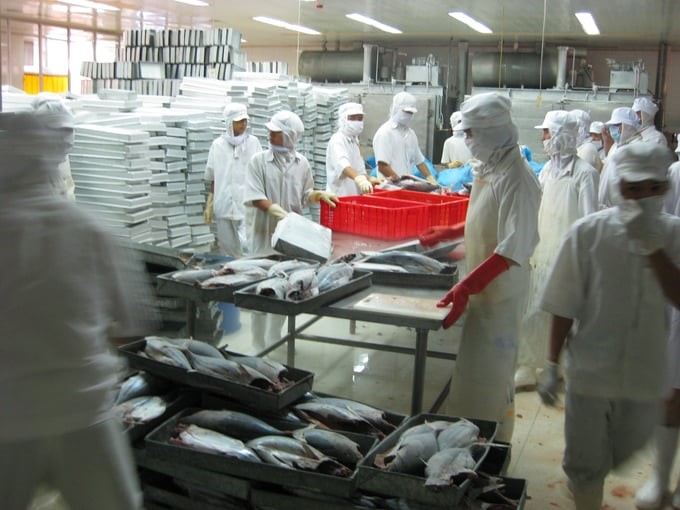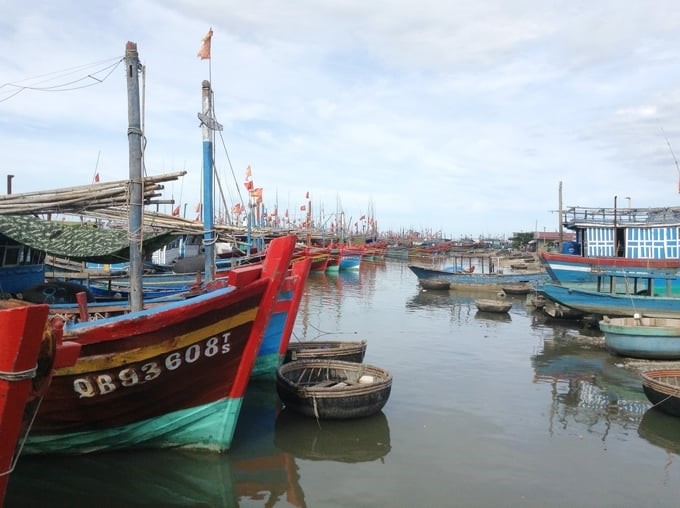June 18, 2025 | 04:40 GMT +7
June 18, 2025 | 04:40 GMT +7
Hotline: 0913.378.918
June 18, 2025 | 04:40 GMT +7
Hotline: 0913.378.918
On April 9, MARD issued Document No. 2555/BNN-CCPT to the Departments of Agriculture and Rural Development of provinces and cities, the Department of Fisheries, the Department of Quality, Processing, and Market Development, and seafood processing and exporting enterprises on implementing the work of food safety and combating illegal, unreported, and unregulated (IUU) seafood exploitation for fishing vessels and fishing ports.
According to the Document, MARD received recommendations from enterprises and associations on the status of management and food safety certification for local fishing vessels and fishing ports, affecting the purchase of raw materials for export processing.

MARD requires seafood processing and exporting enterprises to fully store records of raw material suppliers for the enterprise. Photo: Hong Tham.
In response to the above-mentioned issue, MARD said that regulations of law are now complete and specific, such as Article 60 of the Law on Fisheries 2017, which stipulates that "Fishing vessels without certificates of eligibility for food safety are considered illegal fishing practices" (IUU vessels). Article 78 of the Law on Fisheries 2017 also stipulates that fishing ports must comply with legal regulations on food safety.
The Law on Food Safety 2010 stipulates that food production and trading are conditional activities. Circular 38/2018/TT-BNNPTNT dated December 25, 2018 (amended and supplemented in Circular 32/2022/TT-BNNPTNT dated December 30, 2022) stipulates, "Fishing vessels with a maximum length of 15m or more are subject to appraisal and certification of eligibility for food safety." Circular 17/2018/TTBNNPTNT, dated October 31, 2018, stipulates that "Fishing vessels with a length of less than 15m must sign a commitment to produce and trade agricultural, forestry, and fishery products safely."
In order to improve the effectiveness and efficiency of enforcing legal regulations in state management, especially at the initial production stage in the seafood production and processing chain for domestic consumption and export, MARD requests the Department of Agriculture and Rural Development of coastal provinces and cities to direct functional agencies under the Department to fully and seriously implement Circular 38/2018/TTBNNPTNT dated December 25, 2018 and Circular 17/2018/TT-BNNPTNT dated October 31, 2018.
Urgently inspect and review and soon have a plan to handle fishing vessels that have not yet been appraised, issued with a certificate of eligibility for food safety, or fishing vessels with an expired certificate according to the provisions of Circular 38/2018/TT-MNNPTNT dated December 25, 2018. Fully and seriously implement the appraisal and issuance of food safety certificates, and periodically appraise the maintenance of food safety conditions for the above-mentioned fishing vessels and fishing ports.
Inspect, supervise, and guide compliance with signing food safety commitments for fishing vessels with a length of less than 15m according to management decentralization in MARD's Circular 17/2018/TT-BNNPTNT dated August 31, 2018.
Strictly control fishing vessels leaving the port according to Form No. 04 (Record of inspection of fishing vessels leaving the port) prescribed in Circular No. 01/2022/TT-BNNPTNT dated January 18, 2022, amending and supplementing a number of circulars in the field of fisheries, including ensuring fishing vessels have a Food Safety Certificate or Food Safety Commitment.
Direct fishing ports when issuing certificates of exploited aquatic raw materials (SC) to ensure that 100% of products originate from fishing vessels that do not violate IUU regulations, in which fishing vessels must have a Food Safety Certificate or food safety commitment as prescribed. Disseminate, provide professional training, and improve capacity and responsibility for civil servants and officials in charge of food safety work in the locality.
MARD also requests seafood processing and exporting enterprises to implement commitments to "Say no to IUU" and only buy aquatic raw materials from fishing vessels that have a sufficient Certificate of Eligibility for Food Safety or Food Safety Commitment to ensure compliance with food safety laws and combat IUU fishing.
Seriously implement Circular 17/2021/TT-BNNPTNT on traceability, recalling, and handling of products that do not ensure food safety, which stipulates: "Facilities must establish a food traceability system according to the one-step-back-one-step-forward principle to ensure the ability to identify and trace a product unit at specified stages of the food production and trading process. When there is a request to trace the origin of food, the facility must provide stored information about the unit providing the received shipment and the unit receiving the delivered shipment during the facility’s production and trading processes."
Fully store records of raw material suppliers for enterprises, including records proving that exploited seafood does not violate IUU and food safety regulations in accordance with current regulations, including Circular No. 17/2021/TT-BNNPTNT mentioned above.
Review the enterprise's quality management and internal control processes on food safety (HACCP) and anti-IUU fishing and ensure "3 implementations" in accordance with promulgation procedures.

MARD also requests the Department of Fisheries to direct, guide, and inspect localities in implementing the management of fishing vessels and fishing ports. Photo: Hong Tham.
As for the Department of Quality, Processing, and Market Development, MARD requires inspection of compliance with legal regulations and business processes to ensure compliance with current regulations. In case of necessity, send a document to the Department of Agriculture and Rural Development, local Sub-Departments, and Fishing Port Management Boards of provinces and cities to verify, clarify, and provide records and documents to ensure traceability, ensure food safety, and combat IUU fishing according to management functions and tasks.
Strictly implement the regulations of Circular 17/2021/TT-BNNPTNT on traceability, recalling, and handling of products that do not ensure food safety and the regulations of Vietnamese law and export markets on food safety.
During the process of appraising food safety conditions and certifying export shipments, if violations are detected, a record must be made and transferred to the competent authority for handling according to regulations.
At the same time, MARD also requests the Department of Fisheries to direct, guide, and inspect localities in implementing the management of fishing vessels and fishing ports (including meeting regulations on food safety) and the issuance of a Certificate of Exploited Aquatic Raw Materials (SC) and a Certificate of Exploited Aquatic Resources (CC) in accordance with regulations.
Translated by Huyen Vu Thu

(VAN) The results of national programs are essential for establishing a contemporary livestock sector that is well-equipped to meet the demands of both domestic and international markets, with robust biosafety standards.

(VAN) The UNESCO Global Geopark revalidation of Non nuoc Cao Bang and the transition to a two-tier administrative model are presently undergoing a pivotal moment in Cao Bang, the northernmost province of Vietnam.
/2025/06/13/5330-2-004539_953.jpg)
(VAN) Changing policy mindset and removing investment barriers are urgent requirements to open up new development space for enterprises in the agricultural sector.

(VAN) The areas include the restoration of five million hectares of marine ecosystems.

(VAN) Dr. Le Van Nguyen, Director of the Institute of E-Commerce Management (ECM), emphasizes the potential for green development through the cultivation of fruit trees, particularly in provinces such as Son La.

(VAN) VAAS and numerous Vietnamese enterprises have signed cooperation agreements with Japanese partners to promote agricultural technology and trade connectivity.
/2025/05/29/5625-12-214801_567.jpg)
(VAN) Provincial mergers in the Mekong Delta promise to streamline administration, expand inter-provincial raw material areas, and foster close linkages in agricultural value chains, benefiting both businesses and cooperatives.